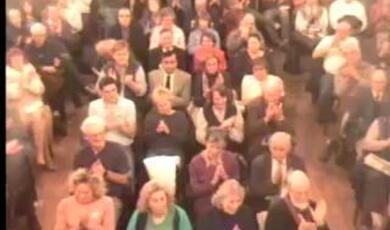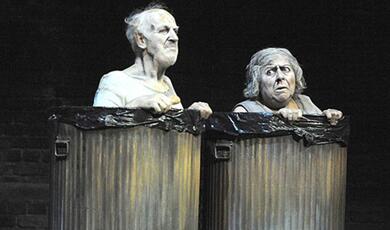The Future of London Theatre
Share
- Details
- Text
- Audio
- Downloads
- Extra Reading
John Maynard Keynes was asked how he saw the future and replied “The future is not seen, it is made”. However, you cannot make the future when dealing with something conceived out of passion. Thus, the future of London Theatre - whether buildings or productions – cannot be planned because they represent the substance of faith.
So let us examine why drama has never been destroyed and, since early Greek and Roman times, has outlived the very civilisations that produced it...
This is the fourth in a series of four 'Mondays at One' lectures on The Theatre in London. Other lectures in this series are as follows:
London Theatre: Past Glories, Today’s Success and Tomorrow’s Opportunities
Is Theatre History? The Alternative Explosion
West End Theatre in China
Download Text
22 October 2012
The Future of London Theatre
Professor Anthony Field
In September 1944 I saw Peter Ustinov’s play “The Banbury Nose” at Wyndham’s Theatre. It traced the story of an old Colonel in Act One, going backwards in time in each act to the fourth and last act when we saw him as a young subaltern. The caption in the programme recorded that “life must be lived forward but can only be properly understood backwards”.
Thus my view of the future of London Theatre should be indicated by looking back over my experience in the theatre over the past seventy years of my career in show business. However, all I seem to have learned is that this is one profession which can hardly be predicted.
Of course, one can always attempt to plan and I know that in my early years as Finance Director of The Arts Council of Great Britain in the 1950s I dreamt of the Treasury’s Grant-In-Aid increasing from its half a million pounds a year in 1950. And, indeed, it did rise and when I left that post in 1985 it had reached £100 million. They were very exciting years and taught me that it was difficult to spend new monies wisely enough to make it possible to deal with later years of austerity.
My other dreams in those days were mainly centred on what I saw was essential for the future of theatre – firstly, the bringing together of the subsidised and commercial theatres, next the need to train people to deal with the management of theatre and production companies and thirdly the development of better marketing techniques.
These problems I tackled in a number of ways. First, I set up the Theatre Investment Fund with £1.5 million capital to invest up to 10% in the production of new plays and musicals. I also encouraged the commercial producers to pick up new productions from regional repertory companies and subsidised theatres in London and exploit them to the benefit of the originating companies and the commercial producers. The first of these productions was the move of “Salad Days” from Bristol Old Vic into the Vaudeville Theatre, the musical Sir Cameron Mackintosh cites as his inspiration to enter showbusiness.
The second problem I tackled by instigating the first ever Arts Management Training courses in the world. These started as a one-year Diploma course at the City University which developed into a three-year degree course and has since been adopted by Universities all over the world.
My interest in marketing was fuelled by the TKTS scheme in New York which led to the development of what is now the Ticket Booth in Leicester Square selling unsold tickets at half-price on the day of performance.
So what of the future? The two main ingredients involved are the theatre buildings and the productions which are presented in them. At last theatre owners appear to have recognised that depreciation and depreciation reserves are essential in every undertaking which is dependant on assets. It still appears to me inconceivable that every Company does not accept that depreciation reserves are to be included in annual accounts to ensure that those benefitting from the utilisation of those assets are being charged properly each year. Thus, in recent years ticket prices all include a small restoration levy to ensure the future fabric of theatre buildings is properly financed.
One must accept that public taste for theatre-going is changing over the years and there is an increased tendency for new audiences to seek unique types of venues and not be confined to the array of forty or so traditional theatre buildings in the West End. Thus, the recent success of a venue such as the Chocolate Factory is a major breakthrough following on the development of such spaces as the Donmar Warehouse and the Tricycle. One of the problems yet to be tackled is the fact that we have lost some thirty small spaces which used to be available to new, young theatre producers. Nowadays, the few such venues are run by artistic directors with their own programmes. In New York there is an array of spaces available for new, small productions to be tried-out and possibly moved into larger theatres and this is what we need in London. One of our priorities should be to find such spaces in London and it may be that large commercial organisations could make available old warehouses which they are waiting to develop and, until planning permission is obtained, could house some few hundred old seats, lighting and sound equipment to enable new work to be seen for a short season.
The future of London Theatre will depend enormously on new work being available so that we are not dependant on revivals of plays and musicals or adaptations of films and television programmes. This can only emanate from funding or organisations giving absolute priority to creativity. The need to fund the social element of audiences should not be a priority for bodies such as the Arts Council. There is still an essential priority for London theatres to continue to convince the Treasury that funding the entertainment and cultural industry is an investment and not merely expenditure. And, furthermore, is an investment which brings returns to the Exchequer more swiftly than almost any other investment.
Some three decades ago statistics proved that the Treasury received some £3 back from every £1 spent on subsidies in the arts. A more recent study has found that the Gateshead and Newcastle local authority’s expenditure on the new Sage Centre has returned some £7 back from every £1 spent. Our current theatrical successes on Broadway are bringing us a better return than any other UK industry.
Any development of theatres brings returns in the forms of VAT on ticket sales, tax from performing artists and technicians, the income produced from ancillary activities such as shops, hotels, transport but more than anything, they provide an environment from which everyone benefits, such as films and television, DVDs, magazines and advertising all dependant on subsidised companies and the experience they give to those developing those activities. Even more, our industries such as textiles, furnishing, building and clothing survive because of their juxtaposition to the arts. The centres such as the Pompidou in Paris and Lincoln Center in New York, and the success of the arts world in Italy and Germany have helped their commercial business world survive best as they co-exist with a strong artistic tradition.
One remains feeling slightly unsure when taking on a title for a lecture such as “The Future of London Theatre” . In any other industry one does not see the future, one makes it. However, in show business one rarely can plan for success- otherwise all producers would be millionaires. Ask Sir Cameron Mackintosh how he can achieve such successes as “Cats” and Les Misérables” and such failures as ”Martin Guerre” and Moby Dick”. It is easy to forget that failures can lose millions of pounds in a few weeks whilst its successes make a few thousand of profit per week. The answer from Cameron is that “I put on what I would like to see if I were going to the theatre – and if the public follows me, so much the better, but they do not always do that!”
In 1947 J B Priestley published an excellent book entitled “Theatre Outlook” which examined what he saw as the future of theatre in the UK for the following fifty years. In many ways it is still relevant today. Priestley was convinced of the need to focus on creativity - which is still true; he was also resolute about the need to convince the Treasury of the great benefits to be reaped from the investments needed to allow the future of the arts and culture in our country to flourish. So the future has not changed much over the past seven decades.
In the last resort we can but remember that the arts out of all aspects of life live on continuously unchanged through times of interpretation, diminishment and neglect; they out-live governments and creeds and societies, even the very civilisations that produced them. They cannot be destroyed altogether because they are what we find again when the ruins are cleared away.
© Professor Anthony Field 2012
Part of:
This event was on Mon, 22 Oct 2012
Support Gresham
Gresham College has offered an outstanding education to the public free of charge for over 400 years. Today, Gresham College plays an important role in fostering a love of learning and a greater understanding of ourselves and the world around us. Your donation will help to widen our reach and to broaden our audience, allowing more people to benefit from a high-quality education from some of the brightest minds.


 Login
Login







